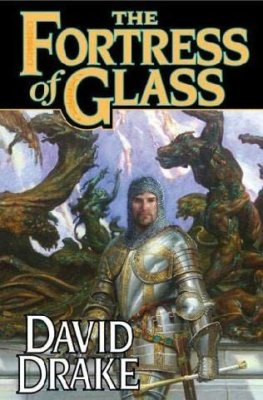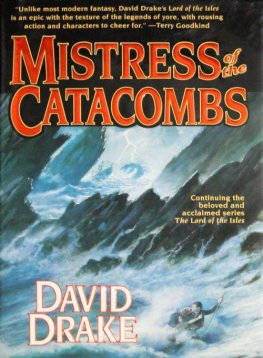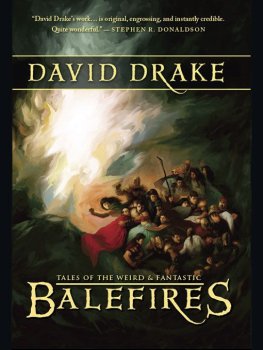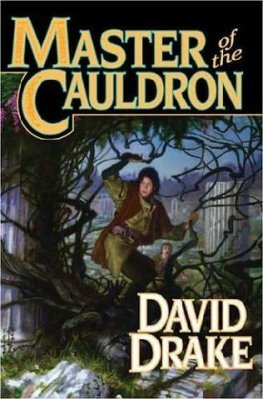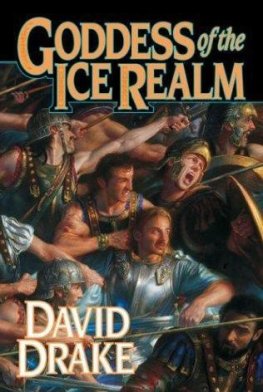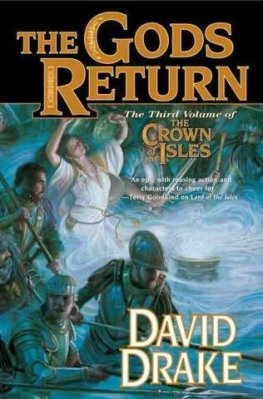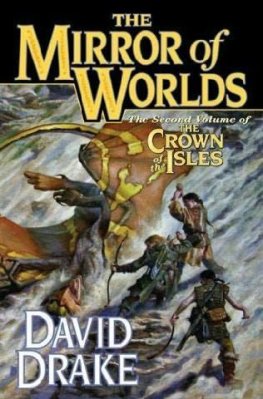David Drake - The Fortress of Glass
Here you can read online David Drake - The Fortress of Glass full text of the book (entire story) in english for free. Download pdf and epub, get meaning, cover and reviews about this ebook. genre: Romance novel. Description of the work, (preface) as well as reviews are available. Best literature library LitArk.com created for fans of good reading and offers a wide selection of genres:
Romance novel
Science fiction
Adventure
Detective
Science
History
Home and family
Prose
Art
Politics
Computer
Non-fiction
Religion
Business
Children
Humor
Choose a favorite category and find really read worthwhile books. Enjoy immersion in the world of imagination, feel the emotions of the characters or learn something new for yourself, make an fascinating discovery.
- Book:The Fortress of Glass
- Author:
- Genre:
- Rating:4 / 5
- Favourites:Add to favourites
- Your mark:
- 80
- 1
- 2
- 3
- 4
- 5
The Fortress of Glass: summary, description and annotation
We offer to read an annotation, description, summary or preface (depends on what the author of the book "The Fortress of Glass" wrote himself). If you haven't found the necessary information about the book — write in the comments, we will try to find it.
The Fortress of Glass — read online for free the complete book (whole text) full work
Below is the text of the book, divided by pages. System saving the place of the last page read, allows you to conveniently read the book "The Fortress of Glass" online for free, without having to search again every time where you left off. Put a bookmark, and you can go to the page where you finished reading at any time.
Font size:
Interval:
Bookmark:
David Drake
The Fortress of Glass
Chapter 1
Tenoctris the Wizard stood in the prow of the royal flagship, staring intently at the sky. "Sharina," she said, "we're suddenly in a focus of enormous power. There's something here. There's somethingcoming here."
Sharina glanced upward also. "Is it good or bad?" she asked, but the wizard was lost in contemplation.
Cumulus clouds were piled over the island of First Atara on the northern horizon, but here aboveThe Shepherd of theIsles there was only a high chalky haze. Whatever Tenoctris was looking at couldn't be seen by an ordinary person like Sharina os-Reise.
Sharina grinned: or, for that matter, seen by Princess Sharina of Haft. In preparation for meeting the ruler of First Atara, she was this afternoon wearing court robes garments of silk brocade stiffened with embroidery in gold thread. They were hot and uncomfortable in most circumstances; here on shipboard they were awkward beyond words. The Shepherd had five oar-banks and was as big as a warship got, but the deck of her streamlined hull was no wider than necessary to allow sailors to trim the yards when the vessel was under sail.
Sometimes Sharina wondered whether she'd feel more at ease in formal garments if she'd been raised wearing them. Liane bos-Benliman, her brother Garric's noble fiancee, certainly wore hers with calm style. On the other hand, Liane did everything with style. If Liane hadn't been such agood person and so obviously in love with Garric, even Sharina might've felt twinges of envy in thinking about her.
Sharina and Garric had been raised by their father, the innkeeper in the tiny community of Barca's Hamlet on Haft. No school for the wealthy could've educated them better in the literature of the Old Kingdom than Reise himself had, but they'd grown up in simple woolen tunics and had gone barefoot half the year.
Sharina grinned. She guessed she could learn to wear court robes more easily than even Liane could learn to wait tables in a common room packed with sheep drovers and their servants, many of them drunk.
Horns and trumpets were calling, slowing the hundred and more ships of the royal fleet to a crawl. A little vessel draped with gaudy bunting was coming out to meet them with a wriggle of oars.
One of the royal triremes, the swift and handy three-banked vessels which were the backbone of the fighting fleet, had already come alongside the stranger and passed it as harmless, though that didn't explain why the island's authorities felt a need to approach Garric-Prince Garric-at sea. No reasonable official would choose to negotiate on the wobbling deck of a warship, since even people who weren't seasick would find a conference table in the palace a better location for spreading documents and consulting ledgers.
"There seem to be five-no, six passengers," Sharina said, peering down at the deck of the twenty-oared barge bringing the Ataran delegation. She frowned and added, "And one of them's just a boy."
The island's present ruler called himself King Cervoran, and his ancestors for hundreds of years had claimed the title "king" also. They'd gotten away with it because First Atara kept to itself, never making trouble for its neighbors or for the King of the Isles in Valles and because for generations the King of the Isles had ruled little more than the island of Ornifal and eventually had ruled nothing outside the walls of the royal palace.
That'd changed when the present King of the Isles, Valence III, adopted a youth named Garric, a descendent of the ancient line of Old Kingdom monarchs, as his son and heir apparent. Ithad to change. Unless there were a strong hand on the kingdom's rudder, the same forces that swept up Garric and his sister would smash the new kingdom. The second catastrophe would finish what that of a thousand years before had left.
It was all well to say that every man should live his life without being pestered by distant officials. That's the way things had been in Barca's Hamlet, pretty much, simply because the community was a tiny backwater on an island which had ceased to be important a thousand years before.
Most of those who said thatnow, however, were local nobles. What they meant by freedom was that nobody from Valles should tell them how they should treat their own peasants. A peasant given the opportunity generally prefers a bully on a distant island to a bully in the castle overlooking his farm. Even better: Garric's governmentdidn't bully and it tried to protect its citizens.
Garric hadn't set out to conquer the other islands of the kingdom; rather, he was visiting thtem one by one in a Royal Progress-accompanied by a fleet and army that obviously could crush any would-be secessionist. As a result, the reunification of the Isles was taking place in conference rooms, not on battlefields.
Tenoctris clasped her hands and muttered in reaction to the pageant she alone saw in the sky. If there were proof that the Gods rather than blind chance ruled the world, it was in the fact that the same cataclysm that brought down the Old Kingdom threw Tenoctris forward from that time to this one.
Wizards used the powers on which the cosmos balanced. These waxed and waned in thousand-year cycles and were at a peak now. Because wizards remained for the most part as blind, clumsy, and foolish as they'd been when they'd conjured music and baubles from the air to amaze guests at a feast, disaster loomed over the New Kingdom as surely as it had wrecked the Old.
Even in these days Tenoctris could affect very little through wizardry, but she saw and understood the powers which greater wizards used in ignorance. Her knowledge and the strong hand of Prince Garric of Haft had so far been enough to reunify the kingdom; and the Isles to be unified if they were to face the threats, human and demonic, which had swollen as the underlying powers increased.
No one could look at the present world and doubt that Good and Evil existed. Those who thought they could remain neutral in the struggle had chosen Evil, even though they wouldn't admit it.
Sharina put her arm around Tenoctris for companionship. The old wizard had lived seventy years or more, and something of the weight of the ten centuries she'd been thrown forward seemed to lie on her shoulders also. Tenoctris didn't believe in the Great Gods and all she'd ever wanted from life was peace for her studies, but she was spending her life in the service of Good.
As were Garric and Sharina and their friends; as were all the members of the royal army and the royal administration. Individually they included better folk and worse, but all were on the right side in the greater struggle or so Sharina believed.
She smiled again, broadly this time. Shedid believe that.
Sharina turned to watch the barge nuzzle theShepherd 's high, curving stern where Garric stood with Liane, a pair of aides, and a squad of black-armored members of the Blood Eagles, the bodyguard regiment. Garric's silvered breastplate made him look both regal and heroic-which was the purpose, of course; nobody expected fighting here on First Atara.
Sharina noticed he hadn't donned the helmet with the flaring gilt wings that completed the outfit, though he probably would before they landed. By the time her brother was fifteen he was already the tallest man in Barca's Hamlet, and the helmet added a full hand's-breadth to that height.
Garric was strong as well as tall, but there was a stronger man yet in the community: Cashel or-Kenset, an orphan raised by his twin sister Ilna after their grandmother died; a quiet fellow, gentle as a lamb and without a lamb's querulous self-importance. A man taller than most, broader than almost any, and stronger than anyone he'd ever met or was likely to meet.
He stood now behind the two women like a wall of muscle, his hickory quarterstaff an upright pillar in his right hand. Sharina, still touching Tenoctris with her left hand, put her right in the crook of his elbow. Cashel smiled because he usually smiled, and he smiled wider because Sharina touched him. It would've embarrassed him to take her hand in public, but nobody seeing the two of them together could doubt that they loved one another.
Font size:
Interval:
Bookmark:
Similar books «The Fortress of Glass»
Look at similar books to The Fortress of Glass. We have selected literature similar in name and meaning in the hope of providing readers with more options to find new, interesting, not yet read works.
Discussion, reviews of the book The Fortress of Glass and just readers' own opinions. Leave your comments, write what you think about the work, its meaning or the main characters. Specify what exactly you liked and what you didn't like, and why you think so.

